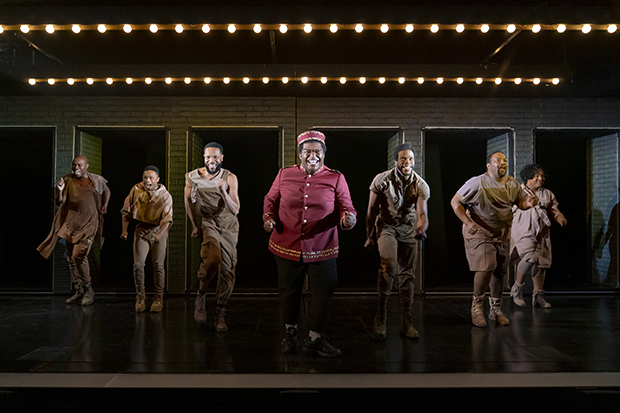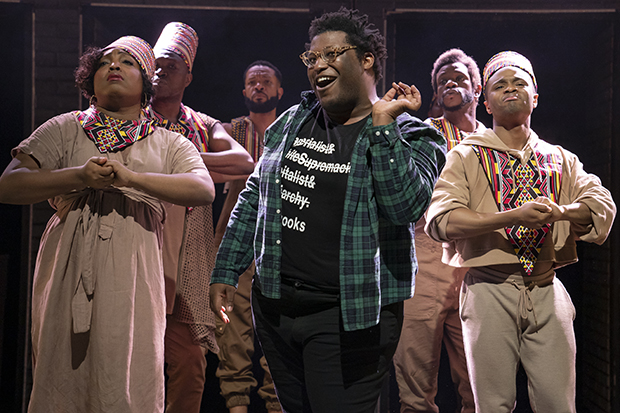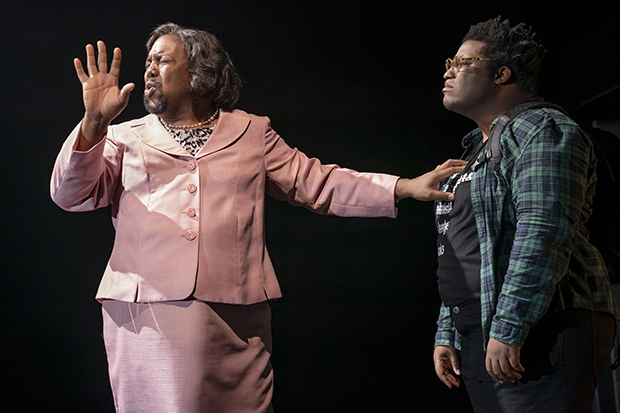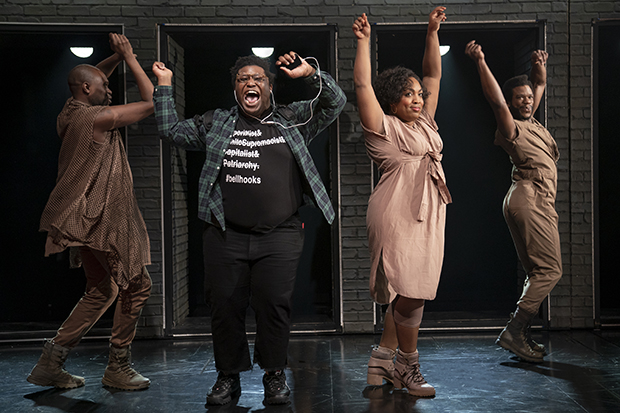A Strange Loop is a Portrait of the Artist as a Young Queer Black Man

(© Joan Marcus)
Usher, we learn in the first few minutes of Michael R. Jackson's A Strange Loop, is both the name of our protagonist (played by the marvelous Larry Owens) and his job description. This gay black aspiring musical theater writer pays his rent by working as an usher at The Lion King on Broadway, a show he doesn't much care for. The first sounds we hear are the chimes he languidly plays to call the audience back from intermission. There is no intermission in this coproduction from Playwrights Horizons and Page 73. Instead, we get 100 uninterrupted minutes of the rawest, funniest, most uncomfortably honest musical you're likely to see all year.
The story is told entirely through the lens of Usher and his chorus of Thoughts (Antwayn Hopper, L Morgan Lee, John-Andrew Morrison, Jason Veasey, James Jackson Jr., and John-Michael Lyles). They tell him he's undesirable, remind him that he's eyeballs-deep in student loans, and label him a race traitor — and that's before they transform into memories of the people who can really make him feel bad: his parents. As he navigates his self-loathing through the perilous waters of unrelenting capitalism, he tries to write a musical that will express his individuality.

(© Joan Marcus)
I always approach plays about playwrights with trepidation, because they often devolve into navel-gazing. There's a fair amount of that in A Strange Loop, but luckily Jackson has a fascinating navel. In Usher, Jackson has created a character that doesn't fit neatly into any tribe, which makes him that much more potent as a dramatic force. When one of the Thoughts rubs his fingers together (as if grasping money) and tells Usher that he needs to give his white audiences "something intersectional to hold onto," Usher responds through gritted teeth, "Intersectionality is so amazing. Absolutely." He's not buying the jargon, but he realizes that plenty of people will pay top dollar for it.
Usher's self-doubt is universally relatable, but it is grounded in specifics: Jackson's brutally honest depiction of Usher's conservative religious family culminates in a gospel number titled "AIDS Is God's Punishment," which underscores a sermon that is Joycean in its length and misery. I don't know how black audiences feel when seeing this cartoonish depiction of black church, but as a gay man watching other scenes that depict the cold transaction of the Scruff meat market, or the judgment of a Truvada-pushing doctor, I thought, He's showing them all of our dirty secrets!

(© Joan Marcus)
It makes the experience that much more stinging that he does it in such style. Jackson (who wrote book, music, and lyrics) sets blunt, forceful language to beautiful melodies. He has written sharp and sophisticated lyrics like, "Why don't you just ravage me with your white gay Dan Savagery?" A hauntingly gorgeous duet between Usher and his mother features the repeated lyric, "Hell is real." The result is a show that uses the language of musical theater to express ideas that have never been uttered in a musical: "Inwood daddy sucking cock all Saturday morning," five of the Thoughts sweetly sing while wearing bedazzled gloves and making jazz hands.
Director Stephen Brackett brings an old-school sense of showmanship to this ultramodern musical, delivering a staging that is as dynamic as a person's actual thoughts. The ensemble members effortlessly transition from one role to the next, a process facilitated by Raja Feather Kelly's liquid choreography and Montana Levi Blanco's stylish and modifiable costumes. Arnulfo Maldonado's set of six door frames is similarly malleable, and the two-tier set for Usher's hypothetical gospel play is breathtaking as it menacingly lurches downstage. Jen Schriever's lighting creates scenes within a shadowy fantasy world, while Alex Hawthorn's sound design ensures that we hear all of Jackson's clever lyrics.

(© Joan Marcus)
Owens is in full possession of those words, delivering them with a clear and powerful voice, even when Usher doesn't feel powerful at all. He inhabits his role with passion and vulnerability, his big eyes telling stories all on their own. Even though he spends much of the musical beating himself up, this is a character we root for thanks to this deeply sympathetic performance.
A Strange Loop may remind audiences of Kirsten Childs's The Bubbly Black Girl Sheds Her Chameleon Skin (which premiered at Playwrights in 2000) and Stew's Passing Strange, two coming-of-age musicals by black artists with a similar penchant for self-reflection. But in listening to Jackson's angsty pastiche, I couldn't help but think of Jackson as a descendant of William Finn, whose melodiously neurotic songs also found an early home at Playwrights. Like a character from Falsettos, Usher is overeducated, nervous, wordy, ambivalent, and depressed — and yet, he keeps singing, and the world is a more joyous place because of his song.










